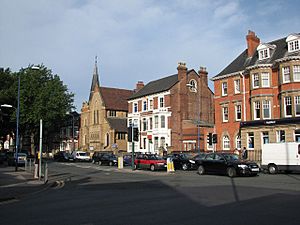Boulevard United Reformed Church, Nottingham facts for kids
Quick facts for kids Boulevard United Reformed Church |
|
|---|---|

Former Hyson Green Congregational Church, now Boulevard United Reformed Church
|
|
| 52°57′54″N 1°07′02″W / 52.965092°N 1.117112°W | |
| Location | Nottingham |
| Country | England |
| Denomination | United Reformed |
| Previous denomination | Congregational |
| Website | www.bridgecentrehysongreen.org.uk |
| History | |
| Former name(s) | Hyson Green Congregational Church |
| Architecture | |
| Architect(s) | Harry Gill |
| Completed | 1900 |
| Construction cost | £4,000 |
The Boulevard United Reformed Church is a special building in Hyson Green, Nottingham. It was first known as the Hyson Green Congregational Church. This church was built a long time ago, in the year 1900. You can find it on Gregory Boulevard.
A Look Back in Time
How the Church Started
The group of people who attended this church first came together in 1824. They were helped by the Castle Gate Congregational Centre. Their very first church building opened its doors on August 8, 1824.
The building you see today replaced that first church. This happened when the Boulevard Congregational Church joined with the Noel-Street Congregational Church.
Building the Church
The current church building was designed by an architect named Harry Gill. It was completed in 1900. The church was built using strong Bulwell stone. It also had special decorations made from Derbyshire stone.
This large church could hold up to 600 people inside. Later on, the church joined with the United Reformed Church.
The Church Organ
In 1909, the church got its organ. This organ was not new; it was bought second-hand from the Castle Gate Congregational Centre. The organ itself was quite old, made in 1865 by a company called Forster and Andrews.
This organ was later moved from the church. It was sent all the way to the Netherlands.
 | Lonnie Johnson |
 | Granville Woods |
 | Lewis Howard Latimer |
 | James West |

